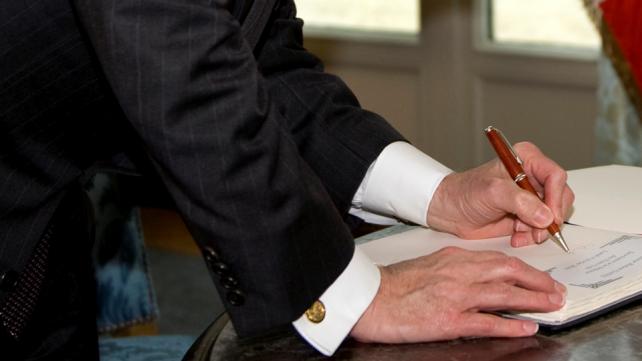
Making your will need not be very difficult. All you really need is a commitment to do it, to contact the right people and draft it.
Sound Vision consulted Toronto, Canada-based Muslim lawyer Faisal Kutty, who has helped Muslims in his community draft general wills and Nasser Nubani, a Chicago-based family law lawyer who has drafted wills for Muslims and non-Muslims. This is some of their advice.
PLEASE NOTE: This is not a legal advice. Circumstances will vary by individual. This is why you must consult a lawyer in your state or province.
Step One
Find an executor. You will need to find someone to ensure that your estate is divided up as specified in your will. This person is called the executor/executrix of the estate. This person must be someone in good health, of sound mind, honest, trustworthy, and of course a good Muslim. Find at least three people for this job. They should be younger and at least one of the selected people should be outside the family circle. This is so that if there is a family tragedy where members of the same family die together, at least someone else is present to execute the will.
Step Two
Contact a few wills and estate lawyers and ask how you can ensure that your estate is divided Islamically. Get all of the details. This will vary by country, state and province, so it's important to get a wills and estate lawyer, not just any lawyer. Mention to the lawyer who the executors of the will are.
Step Three
Look for a Muslim scholar who can give you the correct understanding of how the shares need to be divided. Inform this scholar that the executor will contact him at the time of your death to consult him about how to divide up your estate Islamically, burial and funeral arrangements, and any other issue that has to be clarified from an Islamic perspective with regards to your will.
Step Four
Find two witnesses to your will. These are people who will witness the signing of the will so that in case there is any question that you wrote it after your death, you will have people to testify that you did indeed write this will and that you were in a sound state of mind when you did this.
Witnesses cannot be people entitled to inherit, so most family members are disqualified for this responsibility. The pool of witnesses has to be from friends and those who are not family members. This would also exclude extended family.
Step Five
Once you have done the above, you can start writing your will.
Some of the major things you need to be mention are:
1. State that you revoke any previous wills you have made. And that from this point onwards, all of your property, assets and estate in general must be divided according to this will.
2. Mention the names of the people you want to execute your will.
3. The funeral and your burial
How you want to be buried and your actual funeral-this is where it is important to specify that you must be buried according to the laws of Islam. This means no cremation, no casket, proper Ghusl before burial, etc. It should also be mentioned that you want a Janaza prayer at a mosque as soon after your death as possible, and your body must be buried at an Muslim cemetery.
You can also put in a clause that you don't want an autopsy done on your body unless it is legally required.
4. The guardianship of your children
if you have children that are not at the majority age, in other words, where they need a guardian, then you have to appoint a guardian (please note: the age may vary by state or province). In this case, state in your will that the executor must consult the Islamic scholar to decide who this person will be, as it depends on which of the qualified family members are alive able to be guardians at the time.
5. Put a general clause that says the executor of the will has to pay off all debts first. This includes taxes owed to the state, province or country.
TIP: Keep your will in a folder with an updated list of all of your debt and assets. This way you don't have to keep changing your will every time you gain or lose a debt or asset.
6. Say this will is going to deal with all of your property.
7. Say that ALL debts are the first thing to be paid off. Once again, the Islamic scholar (give his name and contacts) must be consulted on this matter.
8. After this, funeral expenses must be covered.
9. Following this, what remains will be divided up amongst relatives. This must be distributed according to Islamic law in consultation with the aforementioned Islamic scholar.
Note: In some cases, it is also legally permissible to appoint an Islamic institution as an executor of your will. Kutty says this is positive because the executor can get compensated for the work. So the execution of your will can benefit an Islamic institution as well.
10. Consult the lawyer on the legal status of a business corporation or partnership after death. And then instruct the executor to consult the Islamic scholar to decide how to distribute the assets from this business interest.
11. Real estate-speak to the lawyer, and then to the Islamic scholar. There may be laws governing what happens to joint ownership of a home, for instance, following the death of one of the owners.
12. If one wishes to donate part of the estate to an Islamic charity this can be done through a will. However, Islamically one should not donate more than one-third of the estate to charity. Once again one must be specific as to which charity.
13. Sign last page but initial the bottom right hand corner of every page apart from the last one. The witnesses should do the same.
14. It is preferable to get the witness to swear an affidavit. This is a form which indicates the witness swore to the truth of the document. Only one of the witnesses has to do this. This document should be attached to the will. This way you don't have to contact witnesses at the time of death.
Step Six
Put the original copy of your will in a safety deposit box. Give copies of the will to its executors. Make sure the executors know in which bank, for instance, your safety deposit box is located. Check with the bank about the conditions of your executors accessing your safety deposit box in the case of death.
"Defense.gov photo essay 100208-D-7203C-004" by Cherie Cullen - This Image was released by the United States Department of Defense with the ID 100208-D-7203C-004 (next).This tag does not indicate the copyright status of the attached work. A normal copyright tag is still required. See Commons:Licensing for more information. http://www.defense.gov/photoessays/photoessayss.aspx?id=1569. Licensed under Public domain via Wikimedia Commons - http://commons.wikimedia.org/wiki/File:Defense.gov_photo_essay_100208-D-7203C-004.jpg#mediaviewer/File:Defense.gov_photo_essay_100208-D-7203C-004.jpg








Comments
The author just explained
The author just explained procedural details as per law of respective land (it seems like) but missed authenticity of will after death of a Muslim. According to Muslim Fiqqa a Muslim cannot transfer 1/3rd of the total share of his total estate by way of will and that too in favour of some one not comes within definition of his heirs. Will in favor of any legal heirs (irrespective of share in total estate) is void and is not enforceable unless all other legal heirs consented for the same after death of executor.
Location
All Muslims should set up a will and/or trust as the authors recommend. Because rules can change state by state, it is important to work with an attorney who understands Shari'ah and US Law. At http://www.livingmuslim.com we offer more information about Islamic Wills and Islamic Trusts.
Location
Add new comment